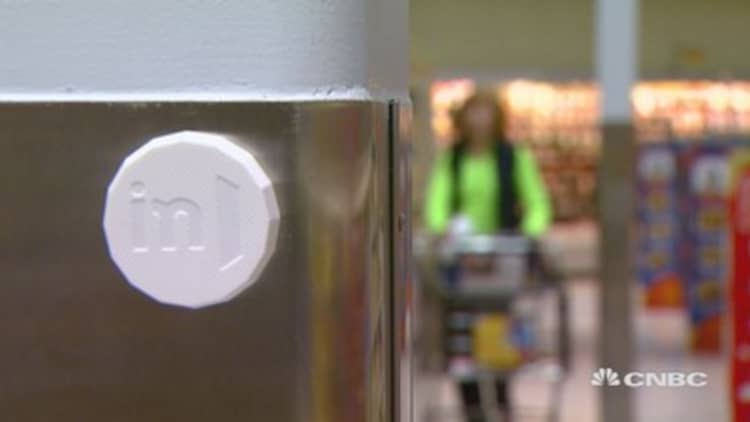
You walk into your local grocery store and your phone buzzes, but this time it's not a text message, it's a welcome message from the store, delivered through an app you downloaded months ago and likely haven't used since.
Whether it's a simple welcome message, a coupon or a promotion, retailers are increasingly trying to engage customers by communicating with them via their downloaded apps, their location and even their digital shopping lists.
These messages are delivered via a $5 hardware device called a beacon, which uses Bluetooth low energy to seek out specific, integrated apps and send relevant messages to shoppers' smartphones as they pass by, all with the goal of driving traffic and sales.
Targeted marketing using geolocation isn't brand new, but what makes beacon technology special is the ability to "wake up" an app a consumer has downloaded, but that isn't open on the device.
Read MoreWal-Mart gets new ammo in Web battle with Amazon
"As we surveyed people and talked to them on the street, people might make a shopping list on their phone, but they might forget about it in that 'moment of truth' when they're in the store," explained Todd Dipaola, CEO of inMarket, a leading mobile shopper marketing platform.
A number of retailers—from Macy's to Gamestop to Marsh Supermarkets—and mall developers such as Simon Property Group and Macerich are among those testing the waters with the new technology.
"Think about an app that you might have on your phone. You've downloaded it, you've taken the time to download it but you forget about it because it's on page six of your phone, [the beacon] will allow brands, marketers to wake up their app and deliver a relevant personalized message to you, as the app user," said Mikael Thygesen, chief marketing officer for Simon Property Group.
Some may call it creepy, but retailers hope shoppers will see it as a helpful service.
Read MoreFinding the lowest price online isn't always easy
Simon Property Group has installed about 4,800 beacons across 192 malls and shopping centers nationwide and not only does it hope mall shoppers will welcome messages sent through the Simon App, but it also sees the beacons as a service for existing retailers in the mall who can integrate their apps and message shoppers through it as well.
The mall operator is betting customers who have downloaded the Simon app will welcome messages sent to their smartphone when they walk into the mall, especially if they reward them with loyalty points automatically for just visiting, or send them information on the latest trends at their favorite shop.
The technology is "potentially transformational" because of its ability to wake up apps and re-engage consumers who may not remember to open up the app every time they come to the store, said Thygesen.
As the technology becomes mainstream, the goal is to have these messages personalized for each consumer to further improve the shopping experience.
Though many beacon networks are still in pilot tests, inMarket and proximity marketing firm Mobiquity, both say there are signs that the devices are boosting both sales and the desire to make a purchase.
Read MoreCan Ron Johnson make this retail venture work?
"We're finding people … are taking it very seriously because it's a very timely message," said Paul Bauersfeld, chief technology officer at Mobiquity Networks. "We're seeing much higher conversion rates from [beacon] advertising than the industry has seen traditionally in just display advertising on web and email."
While implementation of the beacon technology is still in early stages, industry research suggests it could help retailers struggling with declining traffic and sales.
A study conducted by beacon platform Swirl found that 73 percent of shoppers who received a beacon-triggered message on their smartphone said it increased their likelihood of making a purchase during a store visit, while 61 percent said the message would prompt them to visit the store more often.
This year, beacon-influenced, in-store sales are projected to be $4.1 billion for the top-100 U.S. retailers, but are expected to grow to $44.1 billion in 2016—about 1 percent of total U.S. store sales, according to BI Intelligence.
The challenge, however, is delivering a relevant message at exactly the right time to persuade a customer to visit a specific retailer and, once there, to make a purchase.
"We have safeguards in place to make sure the messaging that's delivered is going to be of value to you as the consumer. That you're going to find it interesting because you're in this shoe department and you're interested in shoes and you get an offer for 20 percent off," said Thygesen.
But until then, retailers and beacon network providers are tiptoeing through the data gleaned from users to avoid app deletion.
"One message from an app I trust reminding me about my shopping list or about recipes is helpful, and I can either click on the message or dismiss it. That's like a polite welcome to the store," said Dipaola. However, "too many of those messages is almost like the greeter following you around the store."
And that's exactly what retailers want to avoid.
—CNBC's Courtney Reagan contributed to this report.


